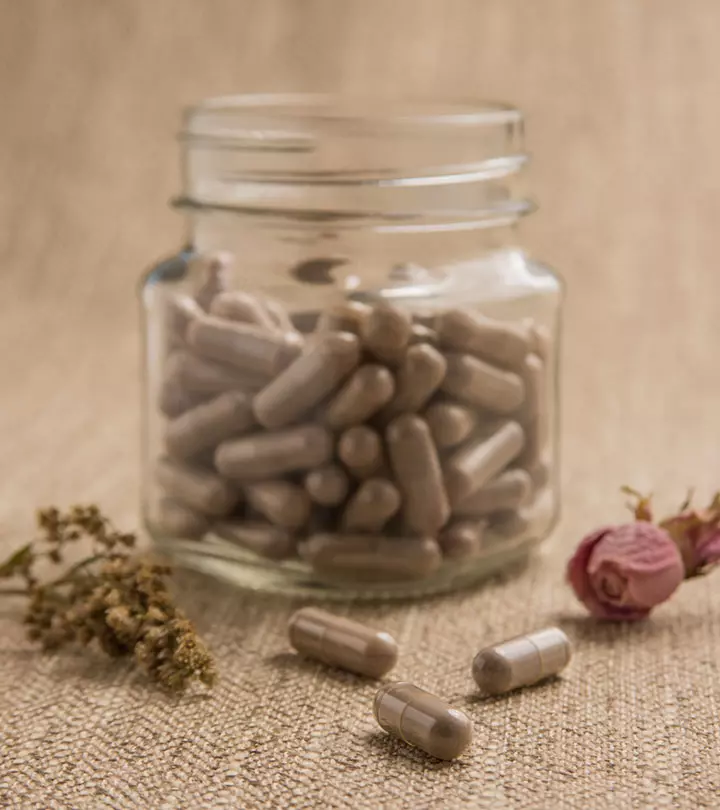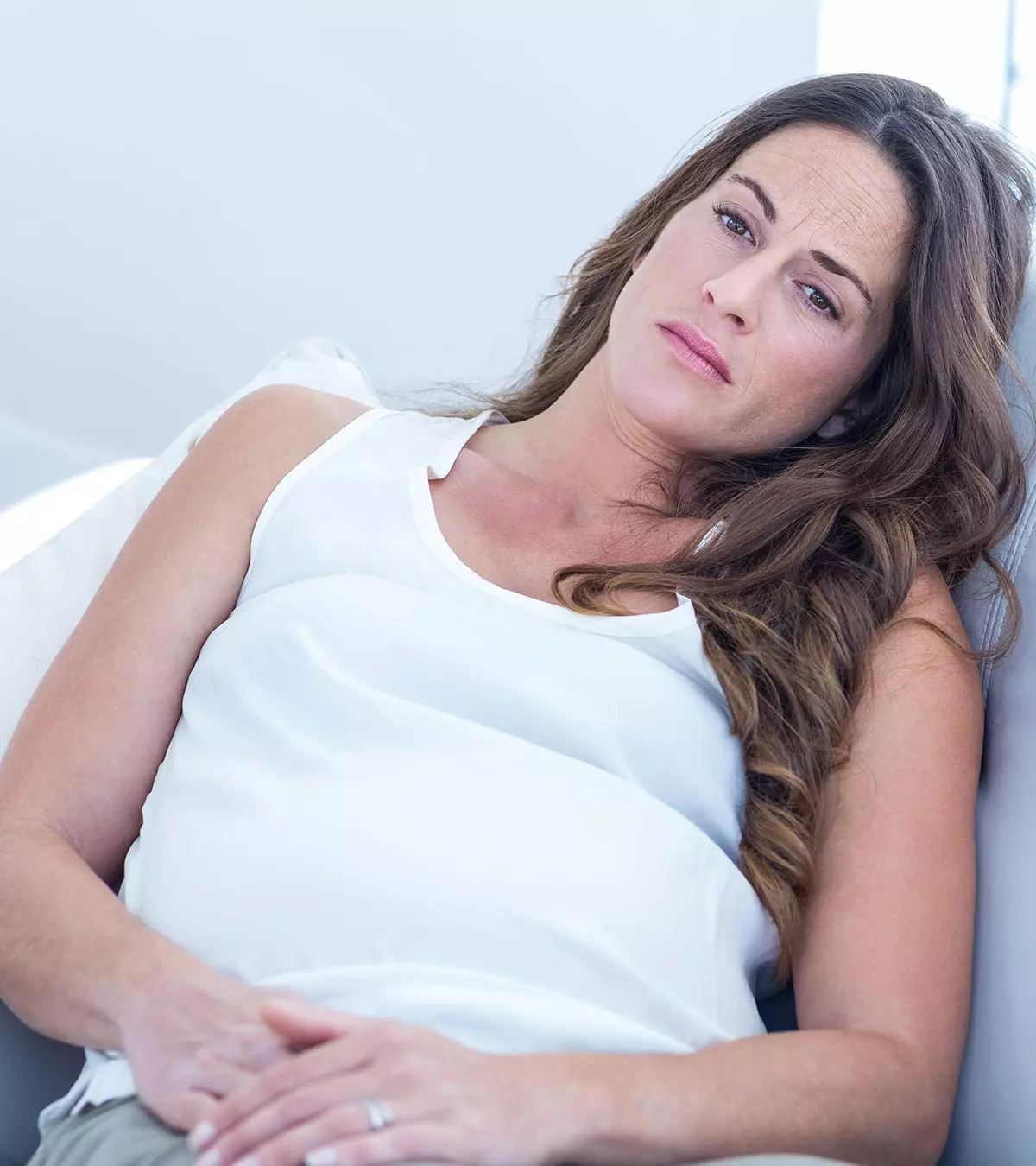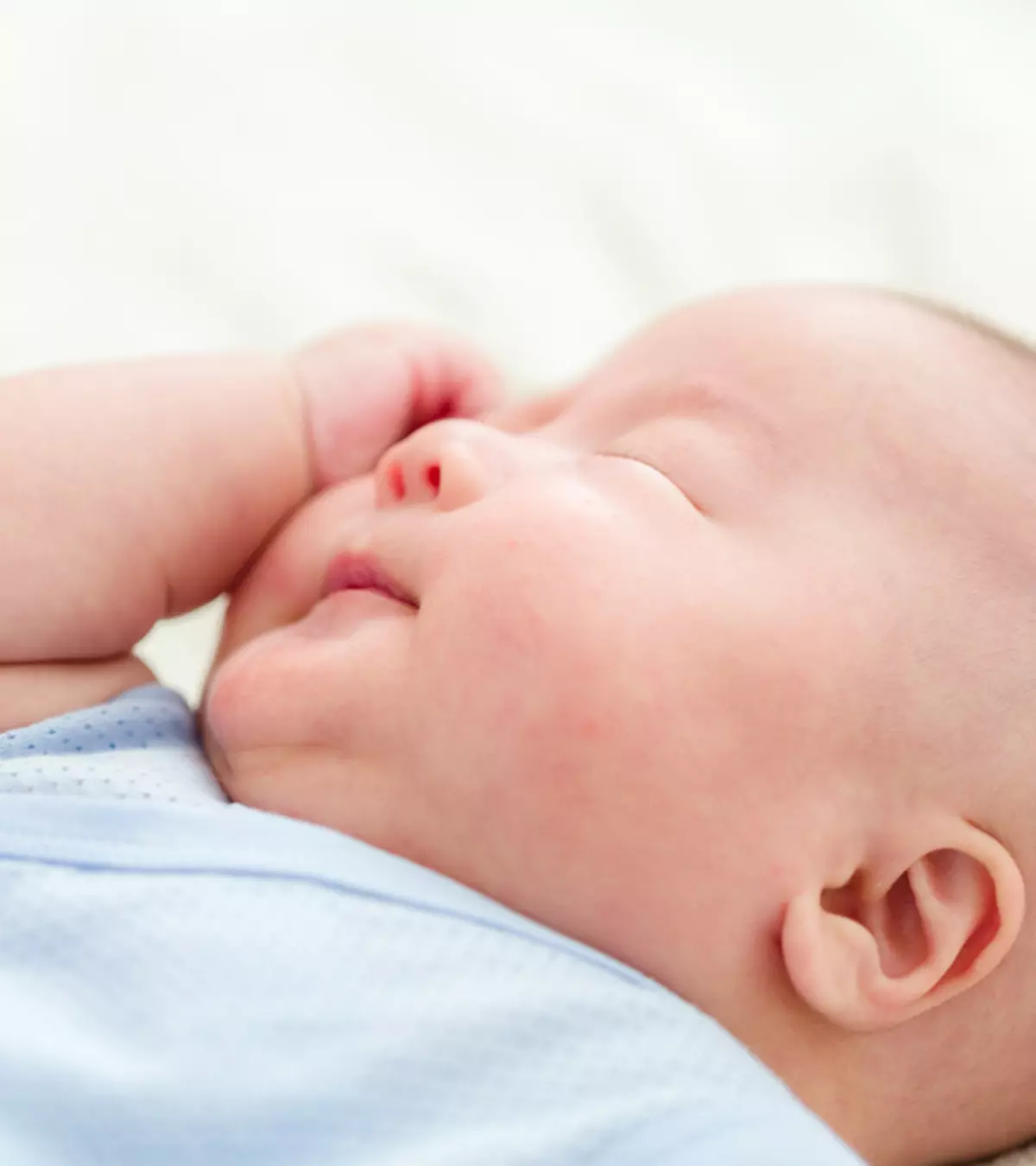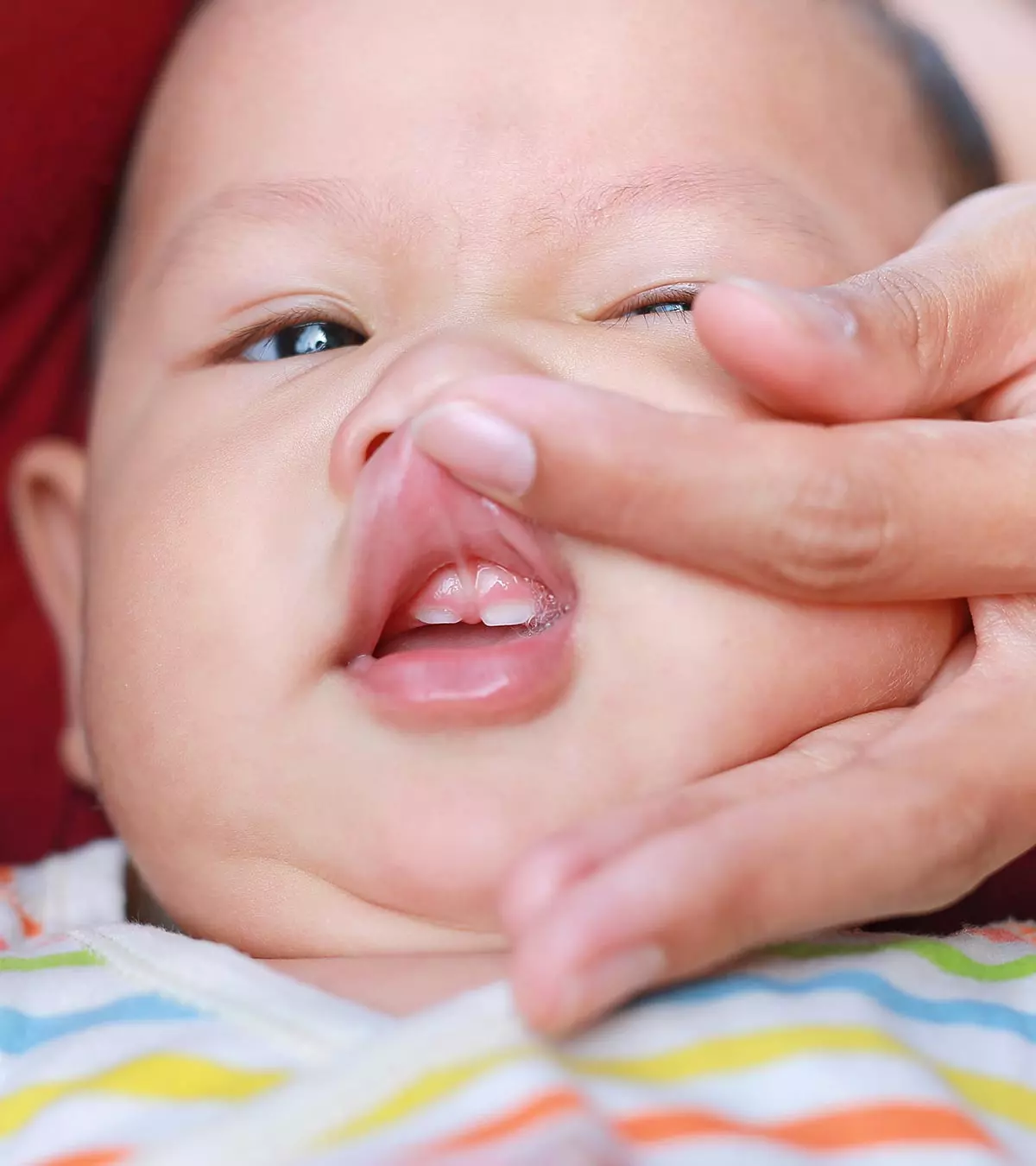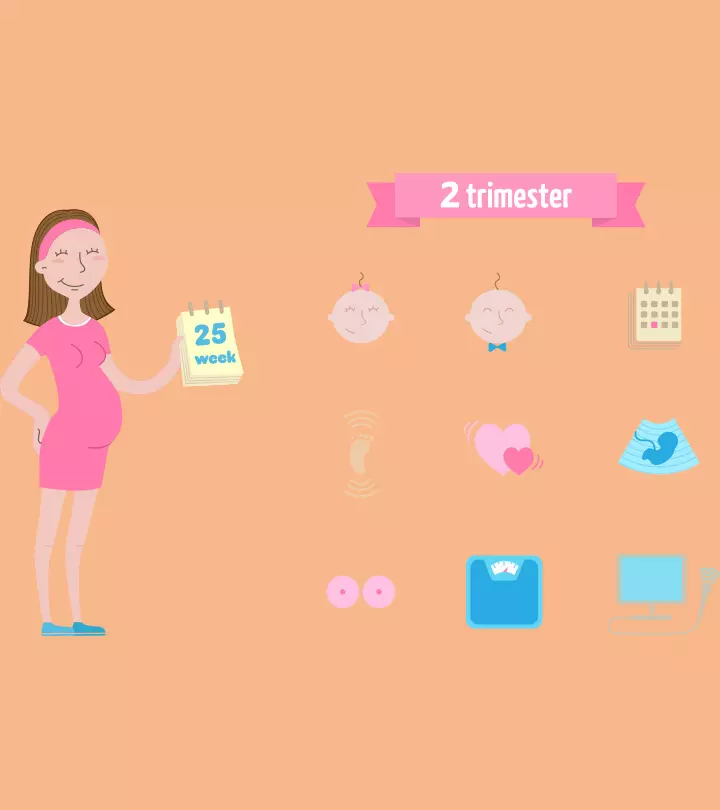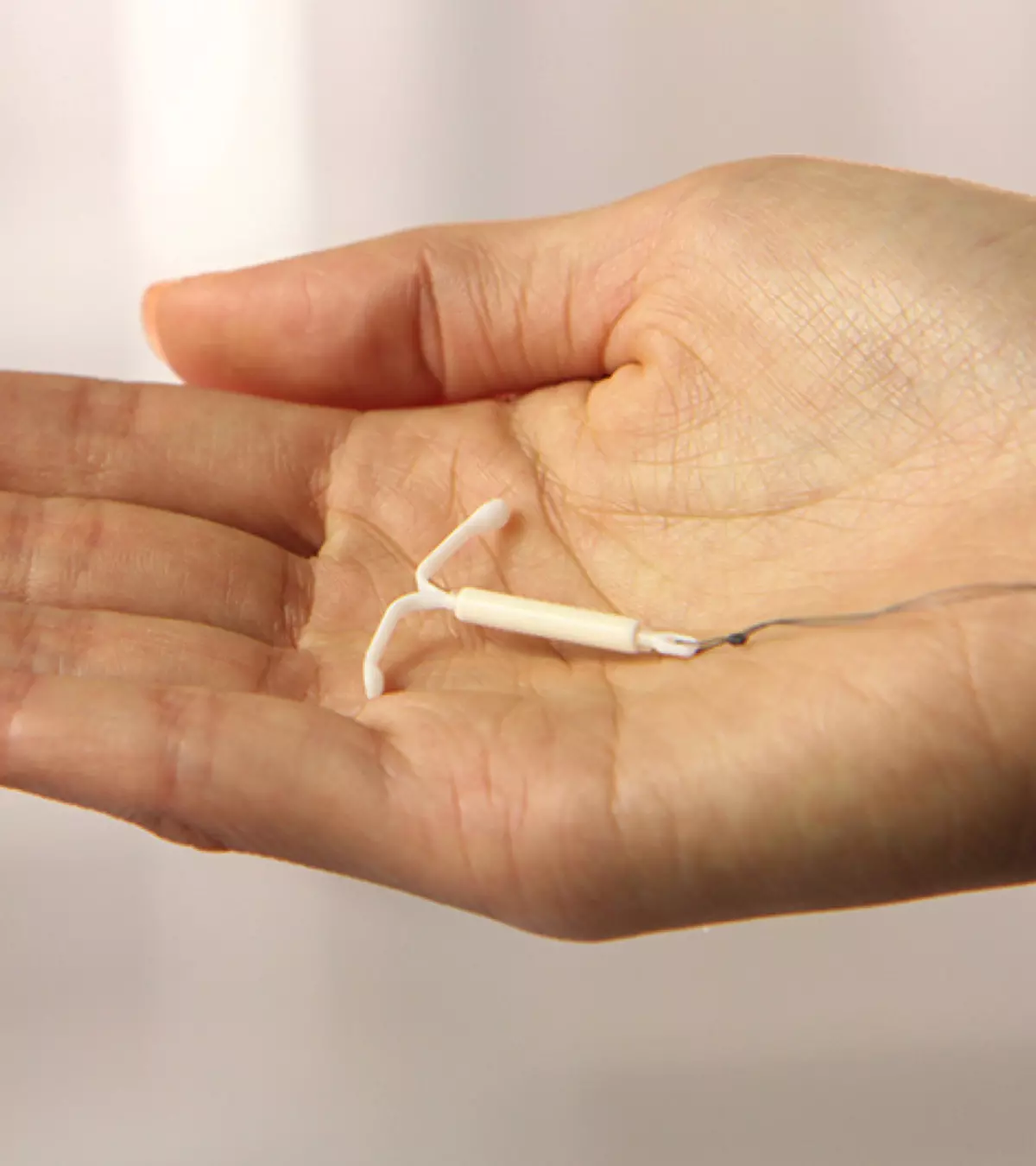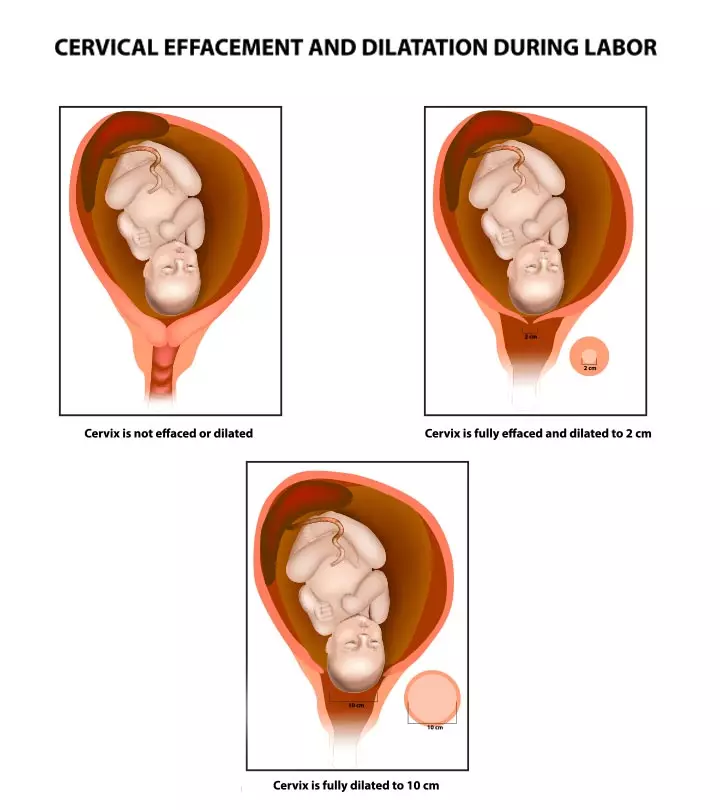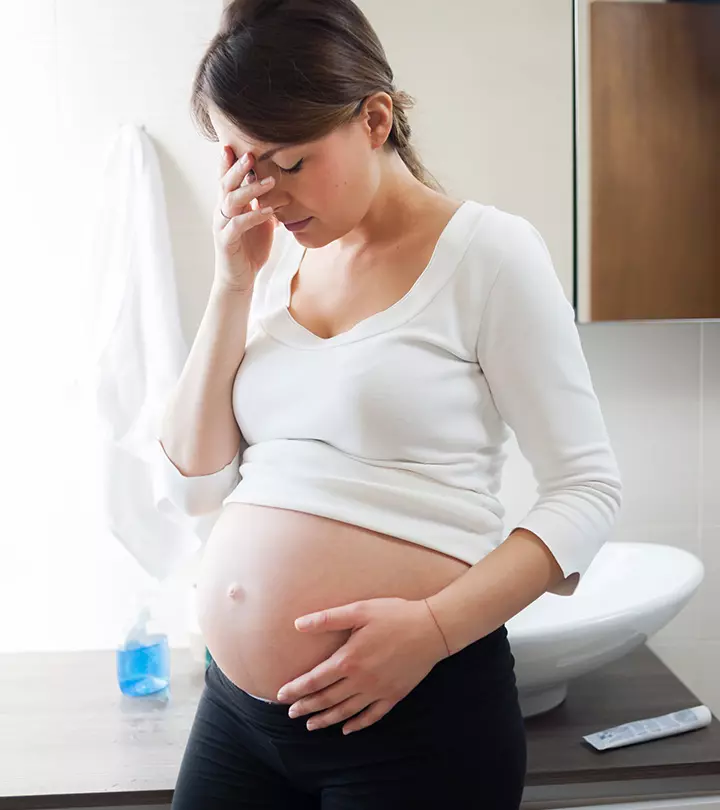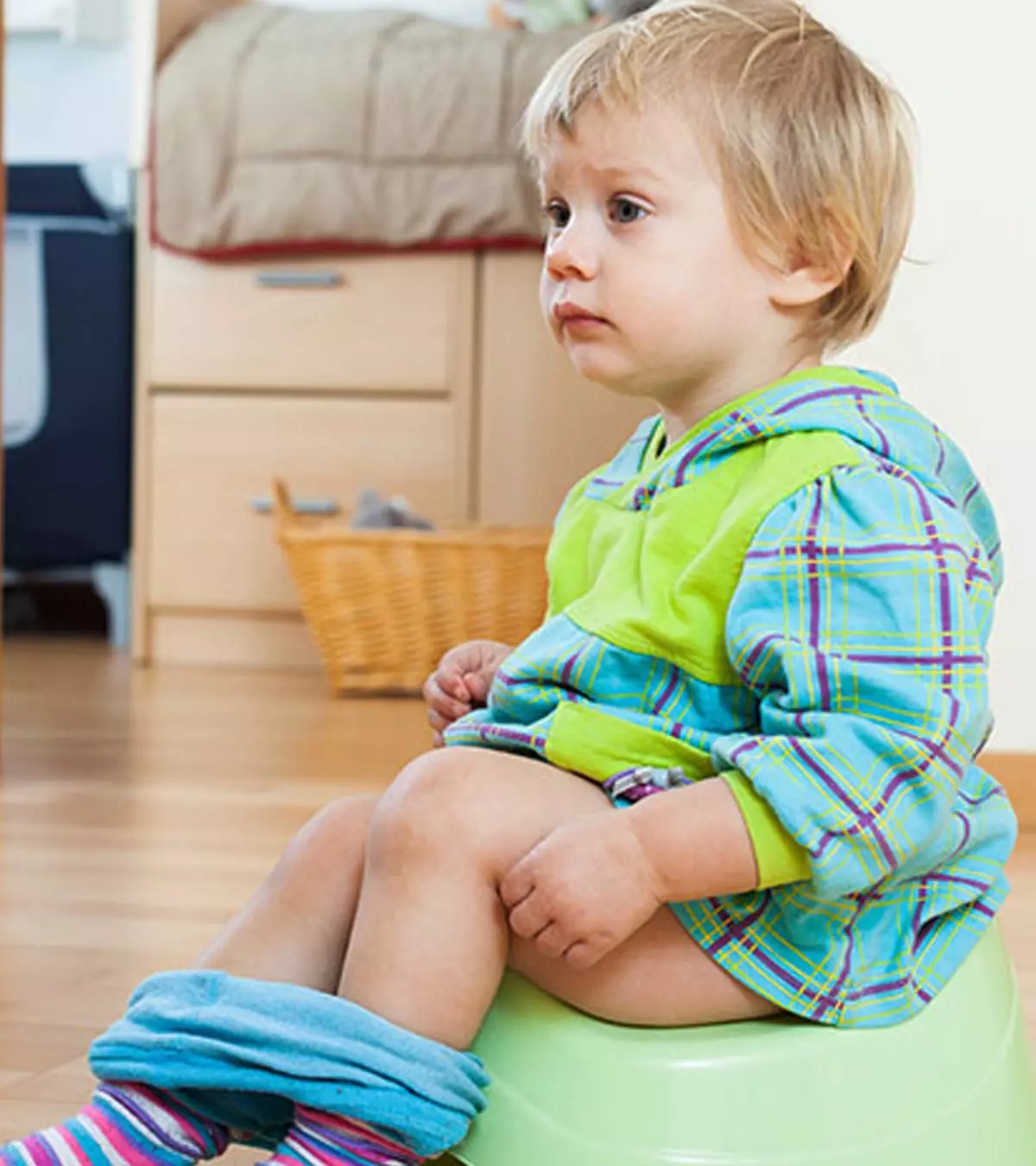
Image: ShutterStock
Diarrhea in toddlers is a common occurrence and should not be a serious cause for concern. The symptoms of diarrhea put the child under physiological stress, which also affects the parents as their child becomes hard to console. Diarrhea can occur due to an early age, stress, intolerance for food, extreme liquid diet, or at times due to a bacterial or viral infection. Read about its common causes, symptoms, home remedies to manage the condition and prevention techniques for diarrhea in your little one.
Key Pointers
- Gastrointestinal tract infections, food poisoning, and food allergies are common causes of diarrhea in toddlers.
- If diarrhea has blood or mucus, or if the child seems drowsy after diarrhea, seek medical attention immediately.
- The doctor may suggest ORS, probiotics, and other medications to treat diarrhea.
- Foods to give when toddlers have diarrhea include boiled rice, boiled chicken, applesauce, bread, and pureed vegetables.
- Maintaining good hygiene and eating home-cooked and fresh food can help prevent diarrhea.
What Is Diarrhea?
According to the World Health Organization (WHO), diarrhea is defined as the passage of three or more watery stools per day. Loose, non-watery, and paste-like stools are not diarrhea; passing many firm/normal stools in a day is also not diarrhea (1). Acute diarrhea lasts a few days to a couple of weeks, while persistent diarrhea is when the watery stools go beyond two weeks. According to UNICEF, diarrhea accounts for around 9% of all mortalities among children under five worldwide.
Scales of diarrhea
The diarrhea stools can happen several times in a day, and it determines the severity of the condition. The American Academy of Pediatrics (AAP) defines diarrhea on the following scales of severity (2):
- Mild diarrhea: 2-5 watery stools in a day
- Moderate diarrhea: 6-9 watery stools in a day
- Severe diarrhea: 10 or more watery stools in a day
Since toddlers eat a variety of solid foods and also self-feed, they have a substantial risk of developing diarrhea. There are numerous reasons why a toddler can get diarrhea.
What Causes Diarrhea In Toddlers?

The following conditions and agents can cause diarrhea in toddlers:
1. Gastrointestinal tract infections:
Infections of the gastrointestinal tract are contracted by consuming contaminated food and water. Some pathogens can even be ingested through oral contact with contaminated objects such as toys. Several pathogens can cause diarrhea, but the following are the most likely to affect toddlers:
- Rotavirus: This is a major cause of diarrhea among children below five years. The virus causes acute gastroenteritis infection with symptoms such as a chronic cough, fever, and severe diarrhea. The virus can cause some fatal consequences when left untreated, but thankfully the infection is preventable with vaccination.
 Things to know
Things to know- Escherichia coli: Also known as E.coli, this bacteria spreads through consumption of uncooked or undercooked food. Poor hygiene such as not washing hands after using the toilet also leads to the spread of the bacteria. E.coli infections cause diarrhea with excessive mucus and blood in the stools (3).
- Salmonella: The bacteria infects both the stomach and the intestines, leading to severe abdominal cramps, fever, and diarrhea. Salmonella enters the body through contaminated food or surface such as toys (4).
- Campylobacter: This bacteria spreads through undercooked, contaminated chicken and unboiled milk. A toddler can also contract the pathogen by coming in contact with pet droppings. Campylobacter infection causes severe diarrhea with blood, and abdominal cramps (5).
- Shigella: The bacteria infects the large intestine, which leads to acute blood-laden diarrhea (6). Usually, there is no fever. Shigella spreads due to poor personal hygiene, including not washing hands after using the toilet (7).
- Adenoviruses: They are a group of viruses that transmit through cough, sneeze, and contact with contaminated food or surfaces. Once inside the body, the virus can find its way into the intestines, eventually leading to persistent diarrhea for more than two weeks.
- Enteroviruses: This is a group of more than 60 viruses that predominantly affect those below ten years. Toddlers can display a host of symptoms when infected by an enterovirus, and one symptom is severe diarrhea with acute vomiting (8).
- Parasitic infections: Numerous parasites cause a toddler’s diarrhea, but the most common ones to affect toddlers is Giardia lamblia. Like other pathogens, it transmits through contaminated food and water.
Several of these infections may also be transmitted due to accidental ingestion of contaminated food and water. For instance, children may swallow some water when swimming in pools, which may be contaminated if the pool is not well-maintained. Julia, a mother of four, discovered this after her son fell sick with stomach flu after visiting a water park. She shares, “By the end of the night, I’m sure he (my son) had gone more than 10 times, the final three times being in the last hour before bed. All of the families on our trip last weekend have been affected by this horribleness in one way or another. Apparently, the internet says that water parks are cesspools for germs. Did not know this. So glad we could find out (i).”
2. Food poisoning:
It occurs when a toddler eats stale food that has colonies of bacteria, fungi, or other microscopic organisms. Unlike gastrointestinal tract infections where the pathogen directly attacks the body, in food poisoning, the diarrhea is caused by the body’s reaction to the toxins released by the pathogens within the stale food. Food poisoning can cause yellow watery diarrhea with blood, and the other symptoms include nausea, vomiting, and fever.
3. Fruit juice:
Yes, Fruit juices can cause mild to moderate diarrhea when consumed in excess or used as an exclusive source of nutrition for the toddler. Fruit juices include juices you make at home and the packaged variety you purchase from the supermarket. In fact, packaged fruit juices contain added sugar and even preservatives that are not good for a toddler. Juices have a concentrated amount of nutrients that is overwhelming for the toddler’s digestive system to absorb. As a result, most of the juice is expelled undigested in the form of watery diarrhea. This kind of diarrhea has no symptoms besides watery stools. (9).
4. Food allergies or intolerance:
Food allergies
occur when the toddler’s immune system mistakes a food protein as a pathogen and mounts an attack. If the toddler’s immune system has a predisposition to an allergy, it will mount an allergic reaction with symptoms such as stomach pain, vomiting, and diarrhea (10). Celiac disease is an example of a food allergy where the body shows an allergic reaction to grains such as wheat, barley, and rye (11).
Food intolerance occurs when the toddler’s digestive system is unable to digest a food compound. For example, galactosemia is a food intolerance condition where the intestines are unable to digest galactose, which is a type of sugar found in milk, including human milk. Food intolerances lead to gastrointestinal tract irritation and diarrhea (12).
 Things to know
Things to know5. Inflammatory bowel diseases (IBD):
It is a group of genetic diseases that cause severe inflammation in the inner lining of the digestive tract. Persistent diarrhea with blood is one of the prominent symptoms of the disease. While there are several IBDs, the most common ones to affect toddlers are ulcerative colitis and Crohn’s disease. These illnesses can cause diarrhea that lasts over a month. As IBDs are genetic, there is no treatment nor can they be diagnosed before birth. Nevertheless, medications subdue the symptoms and help the toddler live a healthy normal life.
7. Pancreatic disorders:
Diseases that interfere with the function of the pancreas or block one of its ducts can eventually cause diarrhea. The most common ailment of the pancreas to affect toddlers is cystic fibrosis. The disease has several symptoms and diarrhea is one of them. Diarrhea due to cystic fibrosis is particularly greasy and has an intense foul smell. There is no treatment for cystic fibrosis, but efficient management of the symptoms can help the toddler live a healthy life (13).
8. Hyperthyroidism:
In this condition, the thyroid gland produces an excess of the thyroid hormone. Hyperthyroidism can itself be a result of some other disease or condition. The surplus thyroid hormone interferes with the healthy function of various organs including the intestines. It can lead to abdominal discomfort and chronic diarrhea.
10. Side effects of medicines:
Some medicines, such as antibiotics, can cause diarrhea as a side effect. Antibiotics do not just kill the harmful bacteria, but also affect the number of good bacteria that facilitate digestion. A decrease in the population of good bacteria can affect the functions of the intestines.
The cause of diarrhea decides how long the condition spans. Stay alert to any subtle symptoms that point towards diarrhea in toddlers.
What Are The Symptoms Of Diarrhea?
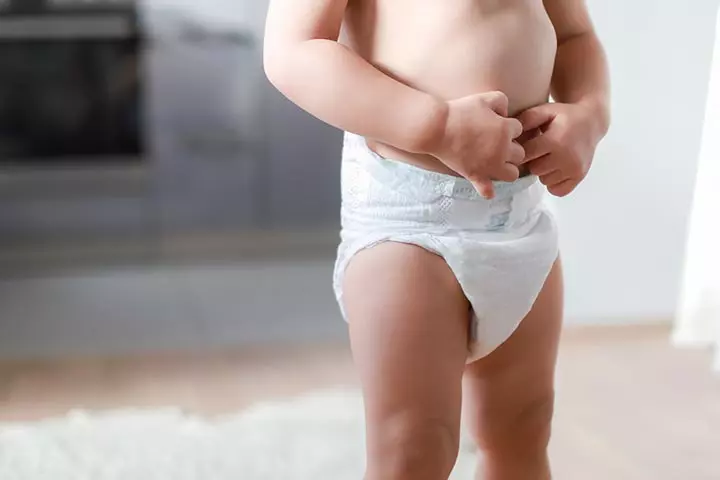
Diarrhea is a symptom in itself and an indicator that something could be wrong with the toddler’s health. But be watchful of the following indicators that may immediately not seem like diarrhea:
- When changing diapers of younger toddlers, you may notice very little solid stool and a lot of soiling from liquids. It could mean that the toddler is having diarrhea. Frequent bowel movements or diarrhea may also make toddlers more prone to diaper rash.
- The passage of loose stools accompanies by abdominal pain and cramps.
- The accumulation of water in the bowels can lead to bloating in the stomach, which in turn can lead to abdominal cramps.
Certain situations warrant you to rush the toddler to a doctor.
When To Rush Your Toddler To A Doctor?
It is best to take the toddler to a doctor when you notice the following symptoms:
- Blood, brown or blackish spots in the stool.
- Toddler feels drowsy or gets semi-conscious after diarrhea.
- The toddler has not passed urine for nearly eight hours. It could be a sign of dehydration caused by surplus loss of water in watery stools.
- Constant fever of over 100.4°F (38°C).
 Point to consider
Point to consider Timely assessment by a pediatrician can help in initiating the treatment for the toddler.
How Is Diarrhea In Toddlers Treated?
The treatment of diarrhea depends on the fundamental cause. The doctor will diagnose the primary reason after analyzing the toddler’s medical history and suggesting a series of blood, stool, and urine tests. The following treatment steps are commonly taken to provide relief from diarrhea:
- ORS or oral rehydration salts help the body recuperate from the loss of fluids. ORS is administered through small sips and can be given to the toddler even by the parent.
- If the toddler seems to be drowsy or semiconscious, then the doctor may consider administering intravenous saline to replenish the lost fluids quickly.
- Antibiotic medications are sometimes used to treat short-term causes of diarrhea while long-term medications might be required for some incurable genetic diseases.
- A 14 -days course helps in building up immunity against intestinal infection.
- Probiotics might help controlling the problem.
- You may shift to soya milk if loose stools persist for more than five days.
There are several over-the-counter (OTC) anti-diarrheal medicines such as Pepto-Bismol available. But never give such medicines to your toddler. According to the US Food And Drug Administration (USFDA), such medicines contain chemicals that may harm the toddler. Only follow the pediatrician’s prescription. Do remember that taking the toddler to a doctor is vital to prevent the onset of any complication.
What Are The Complications Of Diarrhea In Toddlers?
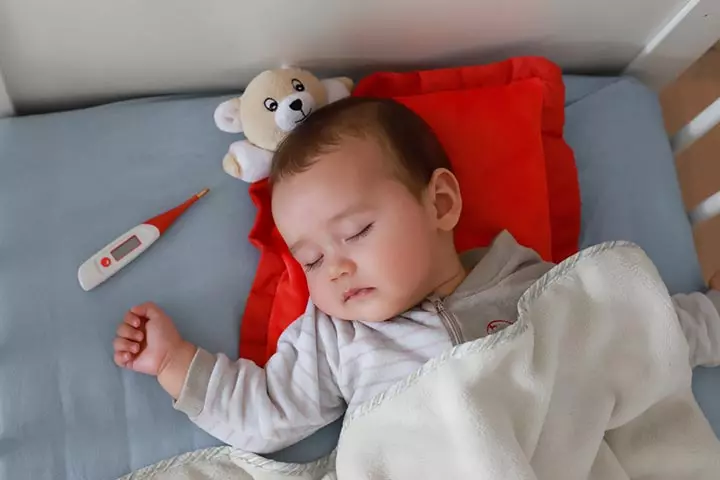
Dehydration is the single most critical complication of diarrhea in toddlers (14). It happens due to the rapid loss of water and electrolytes from the body due to watery stools. The following are the indicators of dehydration in toddlers:
- Dry mouth
- Chronic dark yellow urine or no urination in eight hours
- No tears while crying
- Rapid weight loss in a day
- High fever
- Sunken eyes
Dehydration is the reason why diarrhea can be dangerous for a toddler. But the complications can be prevented at home.
What Are The Home Remedies For Toddler’s Diarrhea?

Diarrhea can be managed at home through the following procedures:
- Provide oral rehydration salts: ORS is available OTC, and is universally recommended for toddler’s diarrhea (15). You can also choose ready-made ORS solutions such as Pedialyte. The salt replenishes the lost electrolytes (such as sodium and potassium) during a bout of diarrhea. Dissolve the ORS as per the suggested quantity on the label and give it to your toddler over the course of four hours. The amount of ORS solution you feed to your toddler depends on the toddler’s weight. The WHO recommends multiplying the toddler’s weight in kilograms with 75 to arrive at the millimeters of ORS that you should give over four hours (16).
- Provide sufficient water: Do not just give ORS, but also ensure that the toddler has a lot of water. Your toddler may feel thirsty due to repeated watery stools, so keep a water bottle handy.
- Give smaller meals at regular intervals: Smaller meals, unlike one big meal, can be easily digested and absorbed by the toddler’s digestive system causing less strain.
- Breastfeed: Breastmilk is rich in several antibodies that protect against a host of pathogens that may cause diarrhea. If you are still breastfeeding your toddler, have frequent sessions when he has diarrhea (17).
Along with breastmilk, you need to feed other foods that are soft on the digestive system.
What To Feed A Toddler Having Diarrhea?
Stick to the following foods until the toddler’s stomach upset passes (18):
- Bananas
- Boiled rice
- Boiled chicken
- Meat broth
- Applesauce
- Whole-wheat bread
- Pureed vegetables such as carrots, mushrooms, beetroot, squash, and zucchini
- Baked or boiled potatoes
- Liquid desserts such as ice-popsicles and sherbets
Remember, your toddler loses sodium during diarrhea, so add some salt to your toddler’s food. A toddler needs no more than 2g of salt per day (19).
When feeding vegetables, always puree them so that it is easy for the toddler to eat and digest. If the toddler has formula, then your doctor might suggest a formula that contains electrolytes for added nourishment. For the best nutritional, consult a pediatric dietician, who can design a diet plan suited to the disease/condition that has led to the toddler’s diarrhea.
What Are The Foods To Avoid During Toddler’s Diarrhea?
If the diarrhea is the result of a food allergy, then the toddler must avoid that food item. In case of lactose intolerance, avoid milk-based formula. A pediatrician can suggest formulas that are non-milk based or have hydrolyzed proteins, which are easier for the toddler’s tummy to digest (20).
Also, avoid the following food items when your toddler suffers from diarrhea (21):
- Milk (cow, buffalo, or goat) except breastmilk
- Dairy products such as cheese and butter
- Fried foods including finger foods such as chunks of chicken and vegetables
- Foods with high sugar content, such as pastries, cakes, and cream biscuits
- Vegetables, such as beans, cabbage, cauliflower, broccoli, and chili-peppers, that form gas
- Fruit juice (all types of juices including “100% fruit juice” that do not contain additives)
Diarrhea is difficult for the toddler; therefore take every care to prevent its onset. And the preventive measures are not difficult to follow.
How To Prevent Diarrhea In Toddlers?
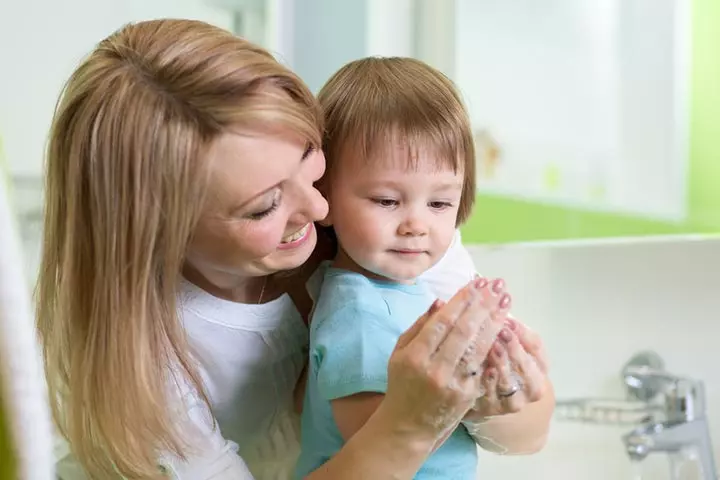
The following measures will make it easy to avoid diarrhea:
- Maintain good hygiene: Several viruses can cause diarrhea, and most of them transmit due to a person’s poor hygiene. Keep the surroundings clean and periodically wash the toddler’s toys. Wash the toddler’s utensils with a disinfectant dishwasher liquid or soap to prevent contamination.
- Teach the toddler to wash hands: Toddlers can be taught some useful habits, such as washing hands after returning from outdoors and after using the toilet. Your toddler may not remember to do so, but you can remind him about the importance of keeping hands clean.
- Provide hygienically-prepared food: Make sure the toddler always gets a well-cooked home meal as cooking destroys pathogens in food. Give boiled milk and clean and purified drinking water to the toddler.
- Others in the family should also maintain hygiene: Viral illnesses that cause diarrhea can transmit through sneezing, coughing, or not washing hands after covering your mouth. Keep your hands clean before handling the toddler. If you have been outdoors, wash your hands thoroughly before touching the toddler.
- Vaccinate: Some diarrhea-causing illnesses, such as rotavirus, can be prevented through vaccination. Consult the pediatrician for an immunization schedule.
Below, we address some additional questions about toddler’s diarrhea.
Frequently Asked Questions
1. Can probiotics cause diarrhea in toddlers?
Probably. Probiotics are food supplements that contain the “good” bacteria, which are naturally present in the gastrointestinal tract. However, when consumed for the first time, probiotics may cause a mild allergic reaction and diarrhea is one of its symptoms. Nevertheless, experts state that probiotics are usually safe, but it is better to consult a pediatrician before using any probiotic supplement for the toddler (22). Homemade yogurt is also a probiotic and can be safely given to the toddler. In fact, probiotics are considered helpful during diarrhea although there is not enough evidence to prove it.
2. Can the color of toddler’s stool indicate diarrhea?
Not necessarily. The color of the stool varies naturally depending on the food consumed. Different colors indicate different conditions or could just be a normal effect of a food (23). However, the consistency of the stool, which could be watery or firm, and its frequency is a significant indicator of diarrhea. The presence of blood or red-colored stool is undoubtedly a sign of worry, but it can happen even with firm stools, and is not limited to watery stools.
3. Can teething cause diarrhea in toddlers?
Teething and diarrhea are unrelated, and teething does not cause diarrhea or other gastrointestinal issues (24). If your toddler is sprouting teeth and also has diarrhea, then it could be because they tend to put everything in their mouth due to gum irritation, and this could lead to infection. Do not delay the treatment for diarrhea assuming that it will cure once the toddler has teethed.
4. Is BRAT diet helpful during diarrhea?
Probably. BRAT stands for banana, rice cereal, applesauce, and toast. These foods are recommended for toddlers with diarrhea, so you could give your toddler a BRAT diet. However, it will not necessarily cure diarrhea. Toddlers who throw up too often are not recommended bananas. Consult a pediatrician or pediatric dietician before choosing a specialized diet for your tod36dler with diarrhea (25).
5. Can too much milk cause diarrhea in toddlers?
Diarrhea in toddlers can be due to various reasons, including gastrointestinal tract issues, food poisoning, food allergies, and excess consumption of fruit juices. Bloating, abdominal cramps and watery stools may indicate diarrhea. You may pay attention to hydration status and provide oral rehydration solutions for the toddler. In severe cases, toddlers may require intravenous fluids and electrolytes and hospitalization to maintain hydration. Medications are prescribed based on the cause and symptoms of diarrhea. Vaccination, washing hands, and consuming adequately prepared foods can reduce the risk of diarrheal diseases in toddlers.
Infographic: How To Manage Toddler’s Diarrhea At Home?
Toddlers may experience diarrhea for various reasons, from infections and food allergies to complicated underlying conditions, such as IBD. Although diarrhea often requires medical intervention and care, home remedies and certain foods can help manage it in toddlers. Check out the infographic below to learn about them.

Illustration: Momjunction Design Team
Illustration: Diarrhea In Toddlers: Causes Symptoms And Treatment
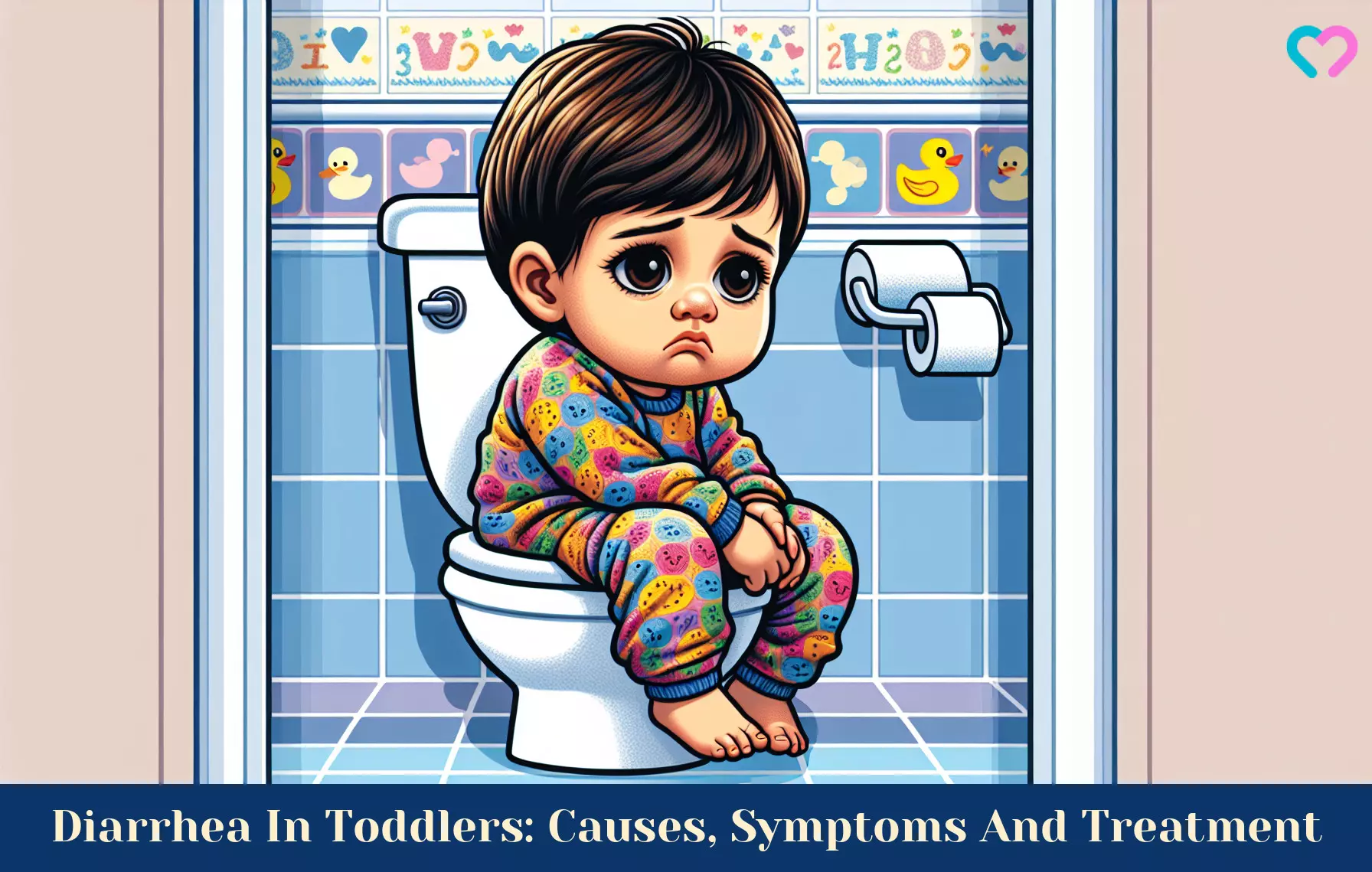
Image: Stable Diffusion/MomJunction Design Team
Having trouble seeing your toddler suffering from diarrhea? Check out this detailed video below for the signs and symptoms. Get further insight on the treatment and tips to manage the symptoms.
Personal Experience: Source
MomJunction articles include first-hand experiences to provide you with better insights through real-life narratives. Here are the sources of personal accounts referenced in this article.
i. Is this a joke? Flu Gods?https://julia-transition.blogspot.com/2013/01/is-this-joke-flu-gods.html
References
- Diarrhoeal disease.
https://www.who.int/en/news-room/fact-sheets/detail/diarrhoeal-disease - Diarrhea.
https://www.healthychildren.org/English/tips-tools/symptom-checker/Pages/symptomviewer.aspx?symptom=Diarrhea - Doyle J. Evans Jr. and Dolores G. Evans; (1996); Escherichia Coli in Diarrheal Disease.
https://www.ncbi.nlm.nih.gov/books/NBK7710/ - Salmonella Infections.
https://www.healthychildren.org/English/health-issues/conditions/infections/Pages/Salmonella-Infections.aspx - Campylobacter Infection in Children.
https://www.urmc.rochester.edu/encyclopedia/content.aspx?contenttypeid=160&contentid=51 - Infections Of The Large Intestine.
https://www.atsu.edu/faculty/chamberlain/website/lectures/Infectionsofthelargeintestine.htm - Hand Washing For Health’s Sake.
https://fcs-hes.ca.uky.edu/files/0905_health_bulletin_adult.pdf - Coxsackievirus Infections in Children.
https://www.healthychildren.org/English/health-issues/conditions/infections/Pages/Coxsackieviruses-and-Other-Enterovirus-Infections.aspx - Melvin B. Heyman et al; (2017); Fruit Juice in Infants Children and Adolescents: Current Recommendations.
https://publications.aap.org/pediatrics/article/139/6/e20170967/38754/Fruit-Juice-in-Infants-Children-and-Adolescents - Food Problems: Is it an Allergy or Intolerance.
https://my.clevelandclinic.org/health/diseases/10009-food-problems-is-it-an-allergy-or-intolerance - Celiac Disease Center.
https://www.nationwidechildrens.org/specialties/celiac-disease-center - Galactosemia.
https://rarediseases.org/rare-diseases/galactosemia/ - Cystic Fibrosis.
https://www.nhlbi.nih.gov/health/cystic-fibrosis - Diarrhea in Children: What Parents Need to Know.
https://www.healthychildren.org/English/health-issues/conditions/abdominal/Pages/Diarrhea.aspx - Treating Dehydration with Electrolyte Solution.
https://www.healthychildren.org/English/health-issues/conditions/abdominal/Pages/Treating-Dehydration-with-Electrolyte-Solution.aspx - Integrated Management of Childhood Illness.
https://apps.who.int/iris/bitstream/handle/10665/104772/9789241506823_Chartbook_eng.pdf;jsessionid=889EBD665A86C0ADB86E62E4A1EF2888?sequence=16 - Feeding Your Baby and Toddler (Birth to Age Two.
https://www.mottchildren.org/posts/your-child/feeding-your-baby-toddler - When your child has diarrhea.
https://medlineplus.gov/ency/patientinstructions/000693.htm - Your baby’s first solid foods.
https://www.nhs.uk/conditions/baby/weaning-and-feeding/babys-first-solid-foods/ - Use of Soy Protein-Based Formulas in Infant Feeding.
https://publications.aap.org/pediatrics/article/121/5/1062/73488/Use-of-Soy-Protein-Based-Formulas-in-Infant - Nutrition Tips For Controlling Diarrhea.
https://www.ucsfhealth.org/education/nutrition-tips-for-controlling-diarrhea - Probiotics.
https://my.clevelandclinic.org/health/treatments/14598-probiotics - What can your child’s poop color tell you?.
https://www.hopkinsmedicine.org/johns-hopkins-childrens-center/what-we-treat/specialties/gastroenterology-hepatology-nutrition/stool-color-overview.html - Teething.
https://cchp.ucsf.edu/sites/g/files/tkssra181/f/teethingen_new.pdf - Diarrhea in infants.
https://medlineplus.gov/ency/article/002118.htm - Is something in your diet causing diarrhea?
https://www.health.harvard.edu/diseases-and-conditions/is-something-in-your-diet-causing-diarrhea - Constipation relief for toddlers.
https://goaskalice.columbia.edu/answered-questions/constipation-relief-toddlers/ - Rotavirus VIS.
https://www.cdc.gov/vaccines/hcp/current-vis/rotavirus.html
Community Experiences
Join the conversation and become a part of our nurturing community! Share your stories, experiences, and insights to connect with fellow parents.
Read full bio of Dr. Arun Wadhwa
Read full bio of Rohit Garoo
Read full bio of Dr. Ritika Shah
Read full bio of Ghazia Shah










